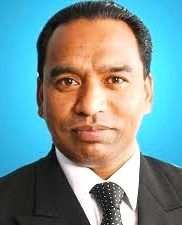
By Asghar Ali Mubarak
Pakistan, a nation founded on ideology, has since fallen prey to elite capture, leaving its citizens to suffer. This elite class is shockingly indifferent to the damage wrought by placing incompetent officials in roles meant for public welfare. The case of the Sindh Emergency Operation Centre (EOC) is emblematic. Here, an 18-grade government employee, entrenched in bureaucratic routine, has been handed a critical role in overseeing the province’s polio program—a responsibility he is woefully unprepared to manage. The cost? A resurgence of polio cases, an avoidable catastrophe, thrusting Pakistan back into global scrutiny. The political landscape is equally disheartening. Both the Pakistan Muslim League (N) and Pakistan People’s Party seem more preoccupied with internal power struggles than with the health crisis threatening their constituencies.
Sindh, once on the brink of being declared polio-free under the stewardship of the former EOC coordinator Fayaz Hussain Abbasi, is now a global polio hotspot, with 12 confirmed cases and numerous positive environmental samples. This tragedy isn’t just a failure for Pakistan—it’s a warning to the world. Perhaps more troubling, however, is the statement recently released by the current EOC Coordinator, a Grade-18 officer, who boldly claimed that if Pakistan contained polio, no environmental polio samples would be found in Gaza. This astounding remark raised concerns internationally, with foreign delegates questioning the legitimacy of the claim and wondering aloud if Pakistan’s polio problem was, indeed, an international contagion. Such irresponsibility from a public official only adds fuel to the perception of Pakistan as a health risk, casting further shadows over the nation’s international relations.
For Pakistan’s citizens, these missteps are more than just political blunders. They reinforce a sense of stigmatization and mistrust that they encounter abroad. Travel restrictions and visa denials are common hurdles; those who do make it through often find themselves viewed as potential health risks. Such distrust is not only demoralizing but reflects the lingering international perception that Pakistan is unable—or unwilling—to tackle basic health issues with competence. This stems from a bureaucratic culture that views merit as an archaic notion, sidelined in favor of expedient appointments that keep the elite’s interests secure. In this climate, expecting true accountability feels naive, but even modest efforts toward appointing capable individuals could mitigate some of the harm done by the current state of mismanagement.
For the average Pakistani, such statements are a further blow. Pakistanis are already facing heightened scrutiny when traveling, if they’re granted visas at all. Those who do travel are often regarded suspiciously, as though they carry with them diseases that might infect the wider world. But merit is not a concept that resonates with Pakistani bureaucracy; any discourse on merit feels out of place, as if it were a relic of a different, more accountable age. The only hope, it seems, is to install even the most minimally competent in key positions, aiming to mitigate the damages wrought by more egregious inadequacies. Today marks the start of a seven-day anti-polio campaign in Sindh, with the Sindh EOC stating that it aims to immunize over 10.6 million children by November 3. This campaign is supported by 81,000 polio workers, guarded by 19,000 security personnel. Yet the odds are daunting, with Karachi’s environmental samples persistently testing positive for the virus.
As I have argued before, Karachi is teetering on the brink of becoming Pakistan’s polio epicenter, a situation that cannot be laid solely at the feet of the Sindh government. Federal oversight and intervention are imperative because the health of Pakistan’s citizens is a national responsibility, no matter what constitutional amendment one invokes to skirt accountability. In closing, I urge the Sindh government, particularly Bilawal Bhutto Zardari and Honorable Asifa Bhutto as well as Prime Minister Focal Person for Polio Ayesha Raza Farooq, to direct their attention to Sindh’s polio crisis, especially in Karachi. It was Asifa who, by taking the polio vaccine as a symbolic gesture, launched Pakistan’s first nationwide polio campaign when her mother, the late Benazir Bhutto, was Prime Minister. Today, Sindh’s vulnerable children need that same level of commitment and dedication. This is not about political ambition; it is about safeguarding the future of Pakistan by ensuring that no child faces the threat of polio. Leadership is needed now more than ever to restore credibility and hope in a system that has failed too many for too long.
(The writer is a senior journalist covering various beats, can be reached at news@metro-morning.com)



